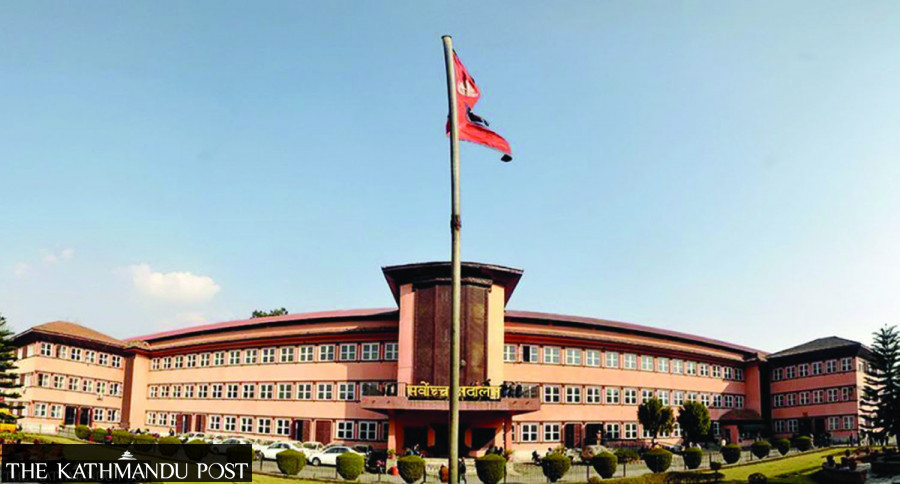National
Court blocks pork barrel fund both in centre and provinces
Interim order questions if lawmakers doing the work of the executive would undermine separation of powers principle.
Prithvi Man Shrestha
The Supreme Court on Wednesday halted the implementation of the controversial Constituency Infrastructure Development Programme at both federal and provincial levels.
Responding to a writ petition filed by advocates Trilok Bahadur Chand and Yagya Prasad Adhikari, a constitutional bench of Chief Justice Bishowambher Prasad Shrestha, Ishwar Prasad Khatiwada, Ananda Mohan Bhattarai, Anil Kumar Sinha and Prakash Man Singh Raut issued an interim order in the name of both federal and provincial government not to implement the programme.
“The court ordered a halt to the programme’s implementation,” said Bimal Poudel, the Supreme Court spokesman.
As per the court’s order obtained by the Post, the federal government has been told not to implement the Constituency Infrastructure Development Programme provisioned in the 445th point of the annual budget for fiscal year 2023-24. Provincial governments have also been ordered not to implement similar programmes in all seven provinces.
The 445th point of the budget has provisioned the Constituency Infrastructure Development Programme, which was previously known by other names including the Local Infrastructure Development Partnership Programme and Constituency Development Fund.
Amid intense pressure from federal lawmakers, the government was forced to reintroduce the programme and allocate Rs50 million to each of the 165 federal constituencies. Under the programme, a minimum of Rs10 million has been allocated for each project across various sectors, which include road construction, irrigation, water supply, education, health, tourism, and sports. This year’s budget has set aside a total of Rs8.25 billion for the programme.
The federal government reintroduced the pork barrel fund after a gap of two years. Likewise, the provincial governments also reintroduced similar programmes as per the demand of the provincial lawmakers.
The scheme has been controversial because of unrestrained power enjoyed by lawmakers in selecting projects and over the alleged misuse of such funds. It was discontinued by the federal government for two years, with the funds diverted to the fight against Covid. Provinces, however, continued the programme.
A special audit conducted by the Office of the Auditor-General in the fiscal year 2016-17 found that projects involving political parties and their sister organisations as well as non-governmental organisations close to the parties were selected, violating the working procedure at the time.
In its order, the Supreme Court also questioned whether lawmakers should undertake tasks that the executive bodies are supposed to handle.
According to the court order, Nepal’s constitution has adopted a democratic governance system based on the separation of powers and Article 75 of the constitution has granted executive authority to the federal Cabinet, while Article 162 has granted executive authority to the provincial Cabinet.
“Performing legislative type of works appears to be the main task of the federal and provincial legislatures,” the court observed. “No authority has been granted [by the constitution] to federal and provincial legislatures to perform executive tasks.”
In this context, lawmakers allocating budget for projects under the Constituency Infrastructure Development Programme which were not recommended by the National Planning Commission, provincial planning commissions and the ministries concerned, could invite a conflict of interest, according to the court. “Such types of development works may not promote good governance,” the Supreme Court observed.
Experts have long questioned the involvement of lawmakers in development projects, since their main mandate is to make laws.
They say the Constituency Infrastructure Development Programme dilutes the power of lawmakers to hold the executive, which spends the money, to account.
“Though the duty of lawmakers is to make laws and policies, they often promise local development to lure voters during elections,” Bimal Koirala, former chief secretary of the government, told the Post in May.
Radheshyam Adhikari, a former lawmaker at the National Assembly, said the court’s latest order was an example of ‘judicial activism’ especially as lawmakers pushed for reintroduction of the programme, which remains largely unpopular among the public.
“But the Supreme Court, which is the interpreter of the constitution, has the authority to decide whether the Constituency Infrastructure Development Programme is against the letter and spirit of the constitution,” he said. “The final verdict will determine whether governments will be able to bring such programmes in the future.”
The court also observed the discriminatory treatment between the lawmakers of the House of Representatives and those of the National Assembly regarding the programme. “It has adopted different standards for lawmakers of the House of Representatives and those of the National Assembly,” the court said.
It said that in a country like Nepal with limited resources, spending a significant chunk of the national treasury in projects chosen by a few lawmakers in a discretionary manner goes against the concept of planned development and norms of good governance.
The Ministry of Finance said that the programme’s implementation method this time is likely to be different from the past with the government looking to implement it through federal ministries.
The budget implementation guidelines say the programme will be implemented by federal ministries.
In the past, local governments used to implement the programme. But officials said lawmakers lobbied for the programme’s implementation via the central government, as the local governments were supposedly not taking ownership of the programme.
Since the country has adopted a federal system and local governments were also elected in 2017 following the promulgation of the new constitution, questions are being raised about whether the country needs schemes like the Constituency Infrastructure Development Programme.
Former chief secretary Koirala had argued in May that allowing federal lawmakers to spend the money would weaken local-level institutions. “Local-level works should be carried out by local governments,” he said. “Only then will they be strengthened.”




 14.24°C Kathmandu
14.24°C Kathmandu















